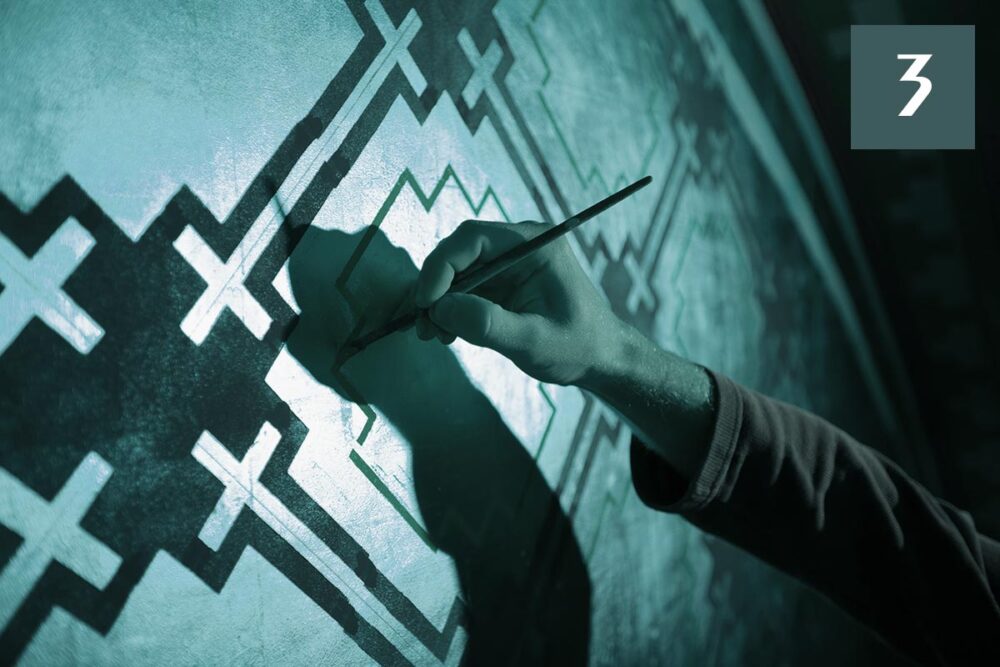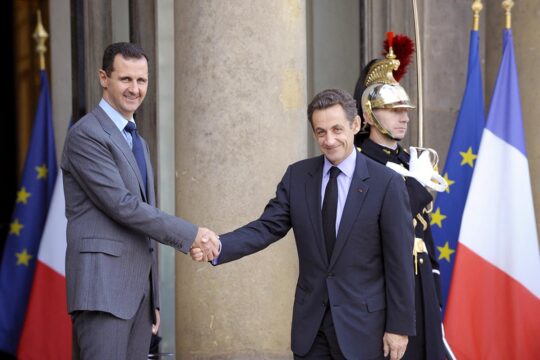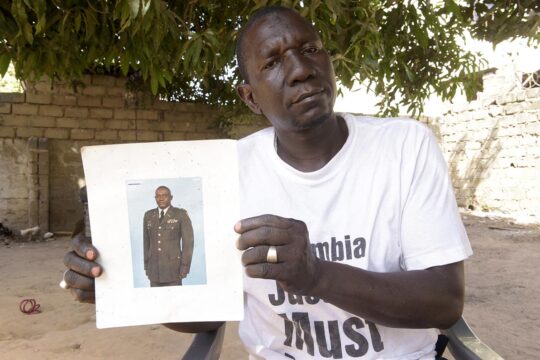Three months ago, Gilbert* received the compensation negotiated by the Commission for Recognition and Reparation (CRR) from the Marist Brothers: “I received my compensation on February 17, 2025, after more than three years of waiting. Our files are anonymous and the commission deliberates. We can’t get the grid on which they decide, it is top secret. We don’t know why we’re getting this money. Some people fight to get it because we don’t understand what there is to hide. I don’t want to say how much I received, because there could be comparisons and criticism from other victims. I didn’t get what I was hoping for, but I thought it was acceptable. When my counsellor told me the amount, she asked me if I felt reassured. I said ‘yes, it’s off to a good start, I’ll consider it satisfactory’. Above all, I wanted to turn the page. The waiting time is so long that you can’t close the page, you can’t say to yourself that it's over. Especially since as I get older, I am having problems with insomnia, and it’s getting worse.”
Claudine: “I got the maximum, 60,000 euros. I didn’t expect to feel such immediate relief. I said to myself: I’ve been recognized. The Church recognizes its wrongs.”
“The Church always owes a debt to victims, which takes the form of a lump sum,” says Claudine*. “It had to cost the Church, and for me it was a way of feeling recognized and participating in reparation. I said that if I received less than 40,000 euros, I wouldn’t feel recognized. I got the maximum, 60,000 euros. I didn’t expect to feel such immediate relief. I said to myself: I’ve been recognized. The Church recognizes its wrongs. I think that from the moment you are recognized, everything changes. It’s as if, all at once, the horizon clears. You’re no longer labelled a victim. You are owed something, and it is paid. That’s really what it’s like for me.”
Yolande du Fayet de la Tour: “It’s the money that brings recognition. The institution is such a liar, it has continued to cover up so much. I couldn’t care less about symbolic reparations, memorials, prayers at Lourdes and so on.”
“In this compensation process, whether or not you are satisfied depends very much on where you are in your inner process,” explains Yolande du Fayet de la Tour. “If you’re in the middle of a psychological process, or if you’re alone without a professional to help deal with your story, you’re in such a state that you won’t be happy with anything. For me, it’s the money, the material sum that brings recognition of previously denied reality; because if you rely on the institution to recognize, it won’t work. The institution is such a liar, it has continued to cover up so much. And I can’t trust its words through some religious person. Their words are worthless. And then it’s the INIRR not the Church that recognizes and compensates. So I don’t expect recognition through the words of the Church, which is why I couldn’t care less about symbolic reparations, memorials, prayers at Lourdes and so on.”
Véronique Garnier: “We've been forced into silence for 50 years. Now we’re finally talking and they’re asking us to keep quiet!”
Véronique Garnier’s satisfaction is not without anger either. “I waited a month between hearing the sum I was going to receive and it being paid. I received a letter from the Selam fund explaining how things were going to work. I was furious, because at the end it says that they have an obligation of confidentiality, which means we do too. We’ve been forced into silence for 50 years. Now we’re finally talking and they’re asking us to keep quiet! That’s not possible. I told them: “You can’t ask silence from people who have been walled in silence.” I was told it was to protect us. I’m aware there’s no point shouting from the rooftops about how much we’ve been paid, because people who have been abused are often fragile, but it’s a lack of respect for us victims.”
Gilbert: “What shocked us, the victims, and what still shocks us, is that these commissions serve as protection, a shield for the Church, which hides behind them, saying ‘OK, we recognize, we’ll pay, and then leave us alone’.”
“What shocked us, the victims, and what still shocks us, is that these commissions serve as protection, a shield for the Church, which hides behind them, saying ‘OK, we recognize, we’ll pay, and then leave us alone’,”adds Gilbert*. And Yolande says: “I’m also critical of the fact that the commissions are not independent. To protect itself and clear its name, the institution buys a clean conscience through the INIRR and the CRR. It is the Church’s magic fix. You ask for forgiveness and then you move on. It’s pretty much in line with the Church’s theological narrative: you make a mistake, you say yes I’ve recognized it and I’ve asked for forgiveness.”
Véronique doesn’t wish to say how much she received. “My procedure ended on March 31, 2023. I received much more than I asked for. And that shocked me because it made me realize that what I’d been through must have been more serious than I imagined. Because it’s anonymous. You have a file number, there’s no name, so it wasn’t a favour done to me. I was shocked. When I was asked how much I thought the financial compensation would be, I was surprised. I replied: “Do you know how much a childhood costs? 5,000, 10,000, 50,000 euros? On the other hand, I said that if they gave me 5,000 euros I’d throw it back in their faces.
It was explained to me that they assessed the situation on three criteria: the facts, the Church’s reaction, or rather lack of reaction, and the consequences, on a scale of 1 to 7 for the CRR and 1 to 10 for the INIRR. I was still annoyed that they hadn’t agreed on the same scale of values when they had the same maximum. After receiving that letter, which really touched me, it took me another year to really realize that it was true. It takes time for it to sink in.”
Rejection of compensation scales and “reinvented” calculation methods
There seems to be a shared lack of understanding of the methods used to calculate reparations, which were roundly criticised by François Devaux: “I found it absurd that legal experts did not start from the little that had already been done in the French Republic -- i.e. the work of justice, with the terms that characterised rape, sexual assault and injury -- and that there was a reinvention of what had already been done, in order to deal with mass reparation for a mass crime. I felt that this approach did away with what had already been done by the French justice system, although we know this is far from enough, particularly in comparison with the Anglo-Saxon countries. So I stopped the process before the INIRR midway through, and never received any compensation.”
Nanou Couturier refused from the outset to go through the CRR system. “I asked to negotiate with the congregation directly. I decided to plead my case directly with the 84-year-old head of the Marists, who knew my three rapists very well. I negotiated for two years. I agreed to let the CRR take part in the negotiations. It went very well. There are times when your anger overwhelms you, but then it subsides. A confrontation took place in Lyon at the end of November 2023. I was one of the first to submit my application to the CRR and I was interviewed in January 2022.
The priest asked me: “What do you want from me?” It was my sister’s and my case, the ceiling was set at 60,000 euros, and we’d been abused by three priests over the years, so I counted 3 x 60,000 euros. I told him that I wanted 180,000 euros for myself and the same for my sister. I warned the CRR that I would never sign for 60,000 euros, and that I would fight again if necessary. I was summoned to the CRR offices in Paris in January 2024 to sign for the compensation. On the way there, on the train, I calculated, I reflected and said to myself that given my age, my loans, my car that needs changing, I would need 100,000 euros to be able to live peacefully with a little nest egg in case of financial worries. And I was told that I would receive 100,000 euros: 60,000 from the CRR plus 40,000 from the Marist Congregation. I sent my bank details and received my money at the end of February 2024.”
What to do with the “money from suffering”?
Michel* asked himself what he was going to do with the money. “I thought about it, and I said to myself that if the nuns wanted only to give me money, I was going to ask for just over half. So I asked for 33,000 euros. Thirty-three is the age when Christ died, and I thought it made sense symbolically. I asked myself what I was going to do with the money. The nuns’ lawyer, to tell you how out of touch she was, said to me: “Sir, you know 33,000 euros is the price of a car. You could buy a car. I said to myself that every time I was in that car I’d think back to that story. I was really shocked when she said that to me. I spoke to my wife about it and we said we’d divide the money between our four children. They said no, that it was my money from suffering and that they didn’t want to be burdened with it. The same goes for my grandchildren. Every year for the last 20 years, I’ve given money to the NGO Handicap International, so I wrote them this big cheque and they asked me where I wanted it to go. I replied: ‘For the children of Gaza and Ukraine’. The managing director called me back, saying they’d never received a cheque for such a sum. He said to me: ‘You were morally wounded as a child and it’s a beautiful symbol that this money is being used to repair children who are physically wounded. We’ll be able to help five or six children who have been victims of war’.”
Gilbert* gave the money to his children. “The last thing I wanted was to make money out of it, so I shared it with my three children, who have suffered from my divorces. There are also proven trans-generational traumas, particularly in one of my grandchildren. I’m keeping some of it in a savings account to pay for therapy. Claudine* agrees. “This money will be used to take my daughters on a trip. It’s symbolic, because they too have suffered from the abuse their mother experienced when she was a young girl.
Véronique: “What we do with this money continues our work of restoration. I said to myself that I wanted to share it with our children because they too have suffered from my past.”
“We all do different things with the money from the INIRR,” explains Véronique. “I have a friend who left. He dreamt of going to Norway, so he went to Norway. I have another friend who bought a work of art. What we do with this money continues our work of restoration. Some people say ‘I don’t want this money because it will always look dirty to me’. So, you see, it’s up to each individual. It’s really very personal. As far as I’m concerned, we don’t have a lot of money, so I said to myself that I wanted to share it with our children because they too have suffered from my past. In the end, we decided to spend some time together between Christmas and New Year, in a gîte. It was an exceptional time.”
Not “repair” but “recovery”?
“I don't like the word ‘repair’ because you fix your car, you fix a machine. I don’t feel repaired,” says Véronique. “’Healing’ is even worse, because you don’t heal. I prefer ‘restoration’. To restore, for me, means in Latin sto/sta/stare, to stand upright. Restoring means getting back on your feet. That’s why I like the word ‘recovery’, which is also the same word as resurrection, in terms of faith. It’s a restoration that is slow, but profound, and that takes place layer by layer, deeper and deeper.”
Commissions that are about to close?
In its activity report at the beginning of 2025, the INIRR announced that its initial mandate had been extended until the summer of 2026. Even though conceived as a “crisis response”, the body “will have to terminate its mission”, the report states. [What about the CRR?]
Victims are shocked by this prospect. Claudine* reacts: “If the statute of limitations has expired, there will be more victims every year. What will happen to these victims once their case has not been dealt with? And so to say that the commissions will have to stop is a denial of the reality that everyone knows by now. The further things go, the more people will dare to speak out. Current events confirm this very clearly.”
“That’s why I'm campaigning for an independent administrative body," says Yolande. “The State should set it up to put into practice what the Church has said, i.e. we recognize, we make money available. The creation of the Selam fund is a very good thing, but the way in which the money is distributed needs to be reviewed. Moreover, this is the only place where we could say that the Church is acting in good faith. Clearly, there is money. Now these 20 million must be managed independently and correctly so that there is equality between the victims. That’s not the case.”
François Devaux: “I’m not against the principle of restorative justice, but in this case, the victims are being used as moral guarantors, to say ‘it's OK, we’ve paid the bill’, when in fact the bill has not been paid at all. There is not the slightest hint of reform in the Catholic Church.”
“Reparation begins at that point of intent, in other words we’re going to reform the system (according to CIASE) so that it never does this again,” insists François. “We haven’t started this reform since the CIASE report, so there’s no way of repairing the damage. The money involved is a detail, almost a symbol. The reparation obtained by CIASE and the quality of its listening is much greater than what the INIRR and CRR have done, and all the victims are almost unanimous about this. So when things are done well, it’s not true to say that victims are just a bunch of burned-out people who bawl their eyes out over everything. I’m not against the principle of restorative justice, but in this case, all this and the victims are being used as moral guarantors to say ‘it's OK, we’ve paid the bill’, when in fact the bill has not been paid at all. There is not the slightest hint of reform in the Catholic Church.”
* Pseudonym
1,240 VICTIMS COMPENSATED
Compensation is not the only form of reparation offered to victims by the commissions, but it is central to their experience of these institutions, which are often described as overwhelmed and faced with denial from the congregations.
By the end of 2024, the two commissions on reparation for victims of violence in the Church had compensated 1,240 people, for an average amount of around €35,000.
The two commissions propose maximum amounts of €60,000. Victims who apply to the Independent National Authority for Recognition and Reparation (INIRR) are compensated via the Selam fund, which is mainly financed by the dioceses. The Commission for Recognition and Reparation (CRR) deals with congregations on a case-by-case basis.
By the end of 2024, the INIRR had handed down 765 decisions, 99% of which awarded financial compensation, and 132 of which awarded the maximum amount. As of 1 February 2024, the Selam fund reported that it had paid out a total of €17.2 million to more than 500 victims.
By the end of 2024, the CRR had issued 475 financial recommendations, for a total of €16.4 million. Unlike the INIRR, reparations are paid according to agreements with religious congregations.








